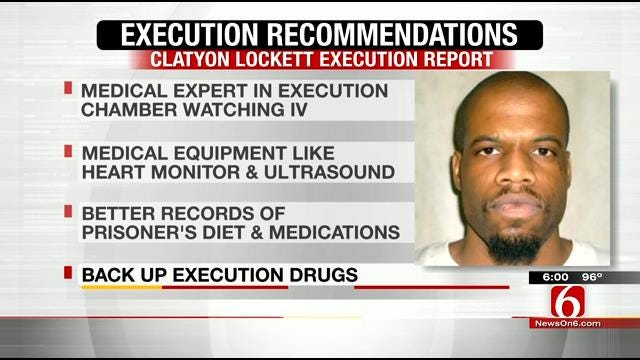DPS Makes Recommendations To Improve Oklahoma's Execution Process
The Department of Public Safety said the drugs used in the execution on an Oklahoma inmate worked properly, but that they weren't delivered correctly.Thursday, September 4th 2014, 6:47 pm
The Department of Public Safety said the drugs used in the execution on an Oklahoma inmate worked as they were supposed to, but what didn't work was the way those drugs were delivered.
The report says because the EMT had trouble finding a viable vein and had to put the I.V. into Clayton Lockett's groin, the drugs ended up going beneath the skin, rather than into the bloodstream, which is why it took them longer to work.
9/4/2014 Related Story: DPS Report On Clayton Lockett Execution Finds Problems With Process
The big criticisms that came out of the investigation were: Department of Correction employees didn't have enough training and they didn't have a backup plan in case something went wrong.
Oklahoma has executed 110 people in the past 25 years and each one went smoothly, but when things didn't go as planned with Lockett, the report said there was confusion, no backup plan and a lack of proper medical equipment in the execution chamber.
Tulsa Attorney Clark Brewster finds that lack of forethought and planning outrageous when it comes to something as important as taking a human life.
"When they went to get the vein for the drugs, they didn't have tape to tape down the I.V., after they lost the vein, they used a different method to get the other veins and ultimately put it into his groin, but the needle wasn't long enough, it wasn't the right size needle. That's putting the cart before the horse and it turned out to be disastrous,” Brewster said.
Plus, the report says a sheet was covering the I.V. in his groin for Lockett's privacy, but because no one could see the I.V., it took much longer to realize there was a problem.
Read The Full Report
DPS made several recommendations, including having a medical person in the execution chamber whose only job is to watch the I.V. and make sure the drugs are going through properly.
Also, having the necessary equipment - including a heart monitor and an ultrasound for veins - keeping better records of what the prisoner ate, drank and any medications and for DOC to have a backup set of execution drugs on hand.
DPS Commissioner, Michael Thompson said, "Just having some thought process - if this happens, we do this, if this happens, we do that - will reduce the stress. Previously, there wasn't a contingency plan, but now I believe those people will be very well trained and very well versed in what to do if there's an emergency."
The Governor said the DOC is already putting some of the changes in place, and she still believes executions are a just punishment for heinous crimes, but the state must make sure it's done properly.
4/30/2014 Related Story: Remembering Stephanie Neiman: Oklahoma Murder Victim's Tragic Story
"Whether you agree with the death penalty or not, we should do it in a way that's civilized and proper,” Brewster said.
Oklahoma's next execution is Charles Warner on November 13th. He was convicted of raping and murdering an 11-month-old baby.
More Like This
September 4th, 2014
April 15th, 2024
April 12th, 2024
March 14th, 2024
Top Headlines
April 23rd, 2024
April 22nd, 2024
April 22nd, 2024














